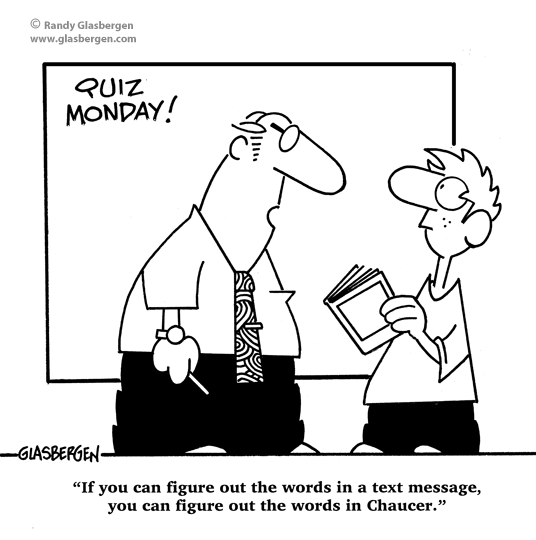

Educating our Children II – The demise of letter grades
Driving home from Toronto a few weeks I caught a program on CBC about the elimination of letter grades on report cards in Maple Ridge, BC. The program was a polite but forceful disagreement between those that think we need numerical or letter grades on report cards and those that think grades do more harm than good – especially for the young. The program got me thinking about what we are trying to accomplish with report cards and with the education system all together.
Tradition vs Progress
The proposal is to eliminate letter grades on report cards for students from Grade 4 to 7 – no more A+ for Little Johnny and no more C- for Little Suzy (paying homage to professor Frank Reynolds). The traditionalists say that this is a bad idea and that not only do students need a clear measure of their competency level but that we are just babying them unfairly because eventually they will move into a world where judgment of competency will matter. Those on the progressive side observe that the letter grades put too much focus on results rather than the process for learning and for many young students grades are demotivational because they start to believe that their grades reflect their innate talents.
Rethinking what we think about thinking
In recent years, the book Mindset by Carol Dweck has gained popularity. Ms. Dweck is a Ph.D and a professor of psychology at Stanford University. I highly recommend her book. To oversimplify 246 pages, Dweck suggests that we all have one of two mindsets: The fixed mindset where we are what we are endowed at birth and the growth mindset where we become who we want to be by making effort to grow. In truth, no one is probably only one of the two mindsets – but in my experience people lean heavily in to one side or another.
At the end of the mindset journey you discover that the growth mindset is the ‘right’ answer. The idea that in life you are not allotted a fixed position of purpose and capability but that you have a world out there to conquer and that you simply need to find your passion, set your goals, make a plan – and then get to work. The fact that you are reading this commentary suggests that you are probably in the growth mindset world. In retrospect, I consider myself to have a delusional growth mindset – one where I not only believe that through hard work we can get anywhere we want but also one where I am also blissfully ignorant of all my shortcomings that might hold me back from my goals. It seems others around me are aware of my shortcomings but stay engaged because of my enthusiasm for the possibilities ahead of us. If you have seen me golf you have seen this delusional optimism on full display.
Changing teams
When my kids started in school I was a traditionalist. Give me the grades and if they are to my standard (B minimum, A+ is better) then I will know that they are getting ready for the competitive world into which we will be launching them. Let’s be honest, the best university programs at the best universities select from the kids with the highest grades. Who doesn’t want to see their kid get good grades, which can be a ticket to the next rung in the ladder of success. I know that my education launched my career which affords my family not only the basics but some of the higher level needs that Maslow helped us realize that we had.
But along the way I started thinking about education differently. Too much focus on the grades means too much focus on the results rather than the process. Every parent of a kid that busts their butt to get a C+ wishes that school was easier for them – but every parent of a kid that coasts to an A++ wishes the kid would learn to work a little harder like the C+ kid next door. Grades are often an indicator of natural talents which doesn’t always translate into a productive role in society. The end-game isn’t to offer employers a newcomer that has good grades – the end-game is to offer employers someone that knows how to work hard, knows how to learn and knows how to step up to do things that don’t come naturally. And let’s be honest, at this stage does anyone care what my mark was in grade 13 calculus?
The other thing that I have seen first-hand is kids thinking that ‘they are good at math’ or ‘they aren’t good at English’ because that is what the report card told them – rather than thinking, ‘I can afford to spend less time on math’ or ‘I need to spend more time on English’. I am lucky that my children have half listened when I told each of them that they are going to need both math and English when they get into the real world.
Experimenting with education
Maple Ridge is experimenting with a ‘no letter grade report card’. To be clear, as an alternative, they are providing each family with a face-to-face conversation about their child’s progress not only on the subject matter but also on “competencies areas — those are big skill sets like curiosity, cooperation, organization, motivation or social responsibility”.
What if they are wrong? What if it doesn’t work? What if these kids show up in high school totally unprepared? These are certainly risks – but they are mostly a risk if the children and parents aren’t listening. If the parents just want a ‘thumbs up or thumbs down’ from the school and don’t want to invest the time to understand how the kids are actually performing, then the fight will continue to bring back letter and percentage grades (the even more precise judgment of something that can’t be judged precisely).
In my mind, if the teachers are prepared to engage in this much more nuanced one-on-one evaluation and motivational effort to bring out the best in each student – bless them, they have my support.




Comments
7